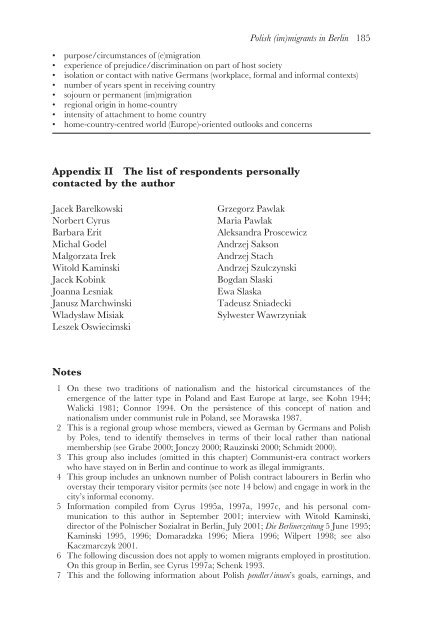Europeanisation, National Identities and Migration ... - europeanization
Europeanisation, National Identities and Migration ... - europeanization
Europeanisation, National Identities and Migration ... - europeanization
Create successful ePaper yourself
Turn your PDF publications into a flip-book with our unique Google optimized e-Paper software.
Polish (im)migrants in Berlin 185<br />
• purpose/circumstances of (e)migration<br />
• experience of prejudice/discrimination on part of host society<br />
• isolation or contact with native Germans (workplace, formal <strong>and</strong> informal contexts)<br />
• number of years spent in receiving country<br />
• sojourn or permanent (im)migration<br />
• regional origin in home-country<br />
• intensity of attachment to home country<br />
• home-country-centred world (Europe)-oriented outlooks <strong>and</strong> concerns<br />
Appendix II The list of respondents personally<br />
contacted by the author<br />
Jacek Barelkowski<br />
Norbert Cyrus<br />
Barbara Erit<br />
Michal Godel<br />
Malgorzata Irek<br />
Witold Kaminski<br />
Jacek Kobink<br />
Joanna Lesniak<br />
Janusz Marchwinski<br />
Wladyslaw Misiak<br />
Leszek Oswiecimski<br />
Grzegorz Pawlak<br />
Maria Pawlak<br />
Aleks<strong>and</strong>ra Proscewicz<br />
Andrzej Sakson<br />
Andrzej Stach<br />
Andrzej Szulczynski<br />
Bogdan Slaski<br />
Ewa Slaska<br />
Tadeusz Sniadecki<br />
Sylwester Wawrzyniak<br />
Notes<br />
1 On these two traditions of nationalism <strong>and</strong> the historical circumstances of the<br />
emergence of the latter type in Pol<strong>and</strong> <strong>and</strong> East Europe at large, see Kohn 1944;<br />
Walicki 1981; Connor 1994. On the persistence of this concept of nation <strong>and</strong><br />
nationalism under communist rule in Pol<strong>and</strong>, see Morawska 1987.<br />
2 This is a regional group whose members, viewed as German by Germans <strong>and</strong> Polish<br />
by Poles, tend to identify themselves in terms of their local rather than national<br />
membership (see Grabe 2000; Jonczy 2000; Rauzinski 2000; Schmidt 2000).<br />
3 This group also includes (omitted in this chapter) Communist-era contract workers<br />
who have stayed on in Berlin <strong>and</strong> continue to work as illegal immigrants.<br />
4 This group includes an unknown number of Polish contract labourers in Berlin who<br />
overstay their temporary visitor permits (see note 14 below) <strong>and</strong> engage in work in the<br />
city’s informal economy.<br />
5 Information compiled from Cyrus 1995a, 1997a, 1997c, <strong>and</strong> his personal communication<br />
to this author in September 2001; interview with Witold Kaminski,<br />
director of the Polnischer Sozialrat in Berlin, July 2001; Die Berlinerzeitung 5 June 1995;<br />
Kaminski 1995, 1996; Domaradzka 1996; Miera 1996; Wilpert 1998; see also<br />
Kaczmarczyk 2001.<br />
6 The following discussion does not apply to women migrants employed in prostitution.<br />
On this group in Berlin, see Cyrus 1997a; Schenk 1993.<br />
7 This <strong>and</strong> the following information about Polish pendler/innen’s goals, earnings, <strong>and</strong>



